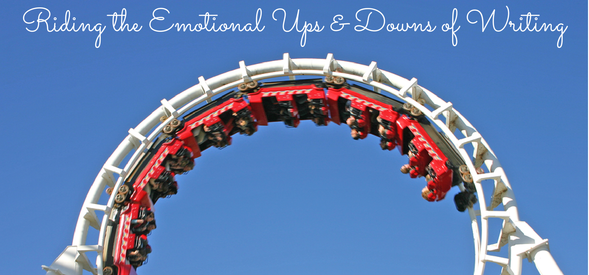
by Jenna | Jun 11, 2014 | Writing Articles
 Note from Jenna: This guest post from one of my screenwriting colleagues and best friends, Isabel Holtreman. Isabel is a talented writer and is one of my most trusted feedback sources, both for my writing itself and for emotional support around the challenges of writing. I’m thrilled she was willing to take the time to talk with us today about navigating the emotional ups and downs of writing, and how she does it.
Note from Jenna: This guest post from one of my screenwriting colleagues and best friends, Isabel Holtreman. Isabel is a talented writer and is one of my most trusted feedback sources, both for my writing itself and for emotional support around the challenges of writing. I’m thrilled she was willing to take the time to talk with us today about navigating the emotional ups and downs of writing, and how she does it.
Be sure and leave a comment at the end of the post and let us know what inspired you.
How to Ride the Emotional Roller Coaster of Being a Writer
by Isabel Holtreman
I’m in marketing mode. I’ve never really taken marketing seriously until now, but it’s that time — the time where you realize that you must push yourself out of the realm of amateur and finally go pro.
Over the past few weeks, I’ve noticed some emotions coming up around where I am in my writing career:
- I miss working on story, something I can’t seem to do while I’m marketing. It engages a different part of my brain.
- I feel like an imposter, like at any moment, someone will find out that I’m not a writer at all, but some big fake who’s trying to fool the world.
- I’m elated when someone asks to read my work, but am devastated when a few days go by without a request.
I experience a similar thing when I’m in writing mode:
- I feel like I should be marketing something, because if I don’t, I’ll never make any money as a writer which will negate my newly acquired professional status.
- I feel like an imposter, like at any moment, someone will find out that I’m not a writer at all, but some big fake who’s trying to fool the world.
- I’m elated when story is flowing and everything is clicking, then devastated when I get stuck or can’t find a way to solve a story problem.
Does any of this sound familiar?
I’m sure it does. Being a writer is hard work. And I’m not just talking about the work itself. It’s difficult to stay even, to function in society, to not allow ourselves to fall into the pit of despair, and keep ourselves from paralyzing.
So, how do we deal with this emotional roller coaster without driving ourselves or our loved ones insane?
And perhaps even more importantly, without giving up on the dream?
Well, once again, we have to be willing to hunker down and do the work. Whether you decide to do the work on paper as I do (or on a computer) and journal, or decide to talk to someone, the fact is, the emotions must be acknowledged, brought to the surface, and observed for all they really are: Feelings.
Feelings are not ultimate truths.
They are simply clues, little alarms that lead us to overcoming our fears, and it’s our job to allow the feeling to flow, jump into our logical minds and say “Oh. Wow. There’s that feeling again. Okay, it’s just a feeling,” then take a step, ANY STEP toward overcoming it and moving forward.
Here are a few tips that have worked for me:
- Cry. I know, I know. It seems counter-intuitive, but it’s a quick way to get the feelings out. Set a timer and cry for 5 minutes, then wipe your eyes and write a sentence. It doesn’t matter whether it’s in a journal or novel or script. The act of writing breeds more writing.
- “It’s just a feeling, it’s not truth.” I repeat this phrase to myself a lot. It helps to help put feelings into perspective and understand that an emotion is just an emotion, a temporary, fleeting thing and that it doesn’t have to stop me.
- Give yourself a break. There’s no use trying to power through if your emotions are overpowering you. For those minutes or hours when you’re feeling at your lowest, step away from the work and connect to your heart, your humanity. Playing with a child, going for a walk, kissing a spouse, getting a hug — all these things put our lives into perspective and help us to realize that writing is what we do and not who we are.
- Journal. This has been the single most effective tool I’ve used for dealing with my emotions, period. Allow your feelings to flow on paper or on your computer for as long as you need, then ask yourself this question: “How can I turn this around?” With a little practice, you’ll find a ray of hope that will pull you out of your fear, anger or sorrow.
All of these tools do one very important thing: they teach us how to step back, observe, and process emotions while we’re still feeling them, which almost immediately reduces their power over us.
The roller coaster of emotions will always be part of the writer’s life, but with a little perspective and a few good tools, we can minimize the ups and downs, find a little peace, and get back to work.

Isabel Holtreman is an optioned screenwriter and consultant with a master’s degree in screenwriting from Cal State.

Thanks for reading!
We’d love to hear your thoughts in the comments.
Warmly,


by Jenna | Apr 18, 2014 | Writing Articles
Much of what's out there in terms of writing support revolves around getting feedback, whether it's through private coaching, mentoring, consulting, editors, agents, or writing groups.
Good feedback can be a wonderful thing (though surprisingly, sometimes it isn't).
Not-so-good feedback, on the other hand, can be spirit-damaging and procrastination-inducing for writers -- and even more so for the sensitive, thoughtful writers among us (myself included).
Some people argue that without feedback, our writing will never improve, while others say we need to focus on developing and hearing our own voices in our writing, and that critiques simply make it hard to learn our own way.
But what is good feedback, really?
Is "good" feedback an ego stroke, where your friends and family tell you how great your work is?
My answer is no.
Is "good" feedback a ruthless, gloves-off, in your face slam of your work that leaves you reeling?
Um, no again.
Good feedback -- in my opinion -- is the kind of feedback that helps a writer do what he or she is trying to do. Good feedback is in line with the vision of the writer's project and helps him or her make it better. It's delivered in a thoughtful, caring tone, without the use of pejorative, labeling terms like "cliché, melodramatic, bad, good, boring, unoriginal", etc, while still clearly and directly pointing to issues and questions that the reader notices. The reader also provides their feedback subjectively, which means that it's conveyed in an "in my opinion" tone with his or her notes, as opposed to an authoritative, "this is the only way it can be" perspective.
Good feedback is also extremely honest, while still being compassionate. When I read for someone, I bring up everything that concerns me that is appropriate to where the writer is on that stage of their writing process. In other words, if I read a script where I can't see the story through the language choices, that's where my feedback starts. If the script is polished to a high sheen, I can give deeper structural, plot, and character motivation notes. (And that's where it really gets fun.)
Bad feedback, on the other hand, is pejorative, rude, condescending, and often just downright snarky. It challenges the writer's very attempts at writing. It is emotionally damaging. It is not kind or thoughtful or sensitive. It creates a creative wound in the writer that takes days, months, and sometimes even years to heal from. It's beyond me why any "consultant" would take it upon themselves to treat another human being in such an inappropriate way.
When good feedback is not such a good thing
Interestingly, sometimes "good" feedback can be just as paralyzing as bad feedback. I've talked to more than a few writers who have received extremely encouraging feedback from potential agents or managers -- usually something along the lines of "this first chapter is terrific, when you finish the rest, I definitely want to read it." But if the writer isn't done with the project, it can lead to a tremendous amounts of pressure to "live up" to the quality of the first (usually highly polished) chapter.
That pressure, in turn, leads to perfectionism, procrastination, and paralysis. Ack!
On choosing feedback sources
My advice when it comes to getting feedback is:
- IF you choose to get feedback, get your earliest feedback from only your most trusted sources, preferably a fellow writer (as opposed to unqualified family and friends) who knows how to deliver compassionate, productive feedback.
- With any further feedback you get, ask for it from professionals that you pay, know, like and trust. Then listen to them.
- Take ALL feedback with a grain of salt. Is it in alignment with your vision? Does it resonate for you internally? If so, listen. If not, take what works and move on.
- Pay attention to notes that have an element of truth to them, even if the specifics don't resonate for you. It's worth delving deeper into the notes to try to understand the why behind what a reader is suggesting. Sometimes the detailed suggestions don't work for you, but the underlying note is accurate and highly useful. I once had a note from a reader where he clearly didn't "get" what my story was about. But rather than tossing the note out the window, I thought, "Hmm, if he's not getting the core of the story I'm wanting to tell, how I can rewrite it in a way that would make what I'm trying to do come through more clearly?" It was a valuable lesson for me, and I'm so glad I stayed with it because it taught me a great deal about my own writing process.
- Avoid getting feedback until you're really ready for it. Many writers rush to get feedback, looking for validation and encouragement, or get it from so many different gurus and sources that their heads are spinning trying to integrate all of it. While I can't give you a specific guideline, what I'm focusing on myself is taking things farther than I think I can go on my own before reaching out for feedback, and trying minimize the number of sources so I can deal with one set of notes at a time, a trick I learned from my mentor Hal.
The power of critique-free writing support
I've seen so many writers struggle with pain and paralysis after receiving feedback -- even good feedback -- that I've come to believe firmly in the value of ADDITIONAL support for writers in the form of critique-free writing support. This is the kind of support that focuses on the process, habit, and motivation behind writing, rather than on critiquing the content of it. (If you're wanting this kind of support for yourself, my online Called to Write community is a resource you might like to check out.)
In my estimation, writers need both kinds of support to see their writing through -- support for their craft and support for their practice or habit of writing:
- Without compassionate feedback, mentoring, and content support, we can flounder when it comes to solving our story or writing problems.
- Without writing practice support, we can have trouble showing up to the page on a regular basis to write.
- And sometimes, after receiving challenging feedback, we need help getting back to the page to write. Finding support for yourself to do that is an incredible gift.
Thanks for reading!
I always love to hear what you think in the comments.
Warmly,


Photo by Zen Chung

by Jenna | Mar 25, 2014 | Writing Articles
When we're learning something new, we like to think that our progress will happen in a straight line.
But progress is rarely linear, is it?
Sometimes we feel discouraged about our progress and try to cheer ourselves up by saying, "well, two steps forward, and one step back."
It helps is normalize our feelings about how things are going.
Other times it can feel like we're just going around and around in circles, never getting anywhere or improving. It's easy to get disheartened when it feels like that.
The spiral path
A long time ago, when I designed the logo for my old website, I had an idea about how our learning and growth DOES seem to have a cyclical nature to it.

But my observation was that on every pass around that circle, I felt myself moving closer and closer to the core of what I was learning, whether it was a new skill for work or a change in my personal growth.
I've written before about mindset and the value of approaching things from the perspective of learning and experimentation versus "failure".
This "spiral path" perspective has been hugely helpful for me in recognizing that when I find myself thinking, "crap, am I HERE AGAIN?", it may actually be that I'm revisiting a familiar place in my path of learning -- but at a deeper level.
The core of truth
Sometimes people like to see the spiral moving outward -- if that works best for you, great!
My take is that there's a core of truth and (self-)knowledge that we're moving closer and closer to over time -- as long as we're paying attention.
For example, as I'm learning to improve my screenwriting skills, I'm finding myself making mistakes I was making a year ago. I could decide that I've "failed" or that I'm not improving, OR, I can choose to see my knowledge and recognition of the mistake as being one "pass" closer to being able to no longer make that mistake because now I understand it and notice it, which is the first step toward making a change.
The levels of mastery
One of my other favorite tools for understanding the learning process is the levels of mastery.
There are four levels of mastery we move through:
- Unconscious incompetence: Where we DON'T KNOW what we don't know, and we're making mistakes over and over again that we don't even recognize, except perhaps in the sense that things "just aren't working".
- Conscious incompetence: This is when we KNOW what we're doing "wrong" but we struggle with changing it. This is one of the most uncomfortable stages of progress and learning, because we can see where we want to be, but we just can't quite get there.
- Conscious competence: When we reach this stage, we know what to do and we know how to do it. But we still have to THINK our way through it, step by step. It feels better, because we're getting the results we want, but we have to plod away at it bit.
- Unconscious competence: This is the blissful level of mastery where we've reached the inner core of knowledge and we no longer even have to think about what we're doing, we just do it.
If you think back to learning to drive a car (or write a screenplay!), you can see how these four levels can play out.
- At level one, unconscious incompetence, you might have argued with your dad when he was trying to teach you how to drive, thinking you knew better than him -- but guess what? You didn't, and you bumped the car into that dumpster he TOLD you that you were going to hit (that never happened to me :) ).
- At level two, conscious incompetence, you had the basic ideas down, but the darn car kept popping into the wrong gear when you shifted and it would lug across the middle of the intersection and all the other cars had to wait (that never happened to me either :) ).
- At level three, conscious competence, you knew what you were doing, but you still had to think about every little detail, in a kind of running commentary in your mind, like this: "Okay, now check the mirrors and the blind spots, make sure there's no one there, turn on the turn signals, check the mirrors again, merge over carefully, turn off the blinkers", etc.
- At level four, unconscious competence, it's easy. Now you just drive -- like you're on autopilot.
The levels of mastery and the spiral path
My sense is that as we move farther "up" the levels of mastery, we're making sweeps around that cyclical path, moving ever closer to that core of knowledge, which we could also call "unconscious competence".
The beauty of this perspective is understanding that we HAVE TO make a lot of "mistakes" and "fail" frequently in order to learn, and we can trust that as long as we hold on to our goals and determination, keep doing the work, and are willing to stay in the discomfort of learning, we can and will get better and better at what it is that we've set out to do, whether it's writing at a new level, learning a new skill, working on our relationships, or raising the bar in our work.

by Jenna | Feb 24, 2014 | Writing Articles
Between being pregnant and having the flu shortly after my Design Your Writing Life class series and the holiday whirlwind, I found myself flat out not writing for much of January. As someone who pretty much always writes six days per week (with the exception of vacations), I was surprised that I actually couldn't write.
The flu this year is a particularly bad one, and I was in bed for two weeks straight, between fever, exhaustion, and a "bonus" sinus infection and massive headaches. And since my immune system is busy doing other things (like not attacking the baby), it's taken me an extra long time to get better, let alone "get back on the writing wagon". (And even longer to get back to blogging, which I've been missing.)
Here's the thing.
Even once you have a solid writing habit established, major life disruptions CAN come along and throw you off your game. And when that happens, what can you do about it? Resistance is a tricky, stealthy operator, and it can concoct all sorts of bizarre reasons and excuses not to start writing again.
So how do you tell the difference between being too tired to write and being "too tired" to write?
What I tell the writers in my community is this: The only person that can ever really know the answer to that is you.
And interestingly for me, that answer has been, "Yes."
In other words— BOTH. I've been truly exhausted and unable to do much of anything other than feed myself, take care of my son, keep my business running, and do the minimum amount of work to keep participating in the classes I'm taking. But I have ALSO had days where I've been in a resistance pickle over not wanting to write — not wanting to face the challenge, being afraid I won't be able to do the work "properly" (perfectionism alert!), and otherwise just avoiding the writing. Plus my regular writing routine (and schedule) have been disrupted by my desperate need for sleep and rest at weird hours. So it's all been tangled up together into one confusing lump of writing, exhaustion, angst, resistance, and not writing.
These kinds of situations can result from all sorts of things, like suddenly having a crushing deadline at work, losing a loved one, a relationship ending, losing a job, other major illnesses, pregnancy, birth, long vacations, etc. Major life transitions can wreak havoc with our regular patterns and we're suddenly back to square one — having lost our writing habit and feeling resistance to getting back on track.
Getting back on track
So let's talk strategy — how to get back on board:
1. Step One: Acknowledge what's going on.
Pay attention to the realities of the emotional, physical, mental, and spiritual needs that are coming up for you. Also notice what's coming up on the writing front in terms of resistance. Are you avoiding it? Does it feel scary? There's no need for judgment here, just compassionate observation.
Acknowledging what's going on will help you make new choices about how to best support yourself through it.
2. Step Two: Coax yourself through the resistance.
If you've gotten off the writing track, there WILL be resistance. It's normal, it's nothing to worry about, and it can be hard to overcome. So coax yourself through it.
At times like this, I tell myself, "How about writing for just 15 minutes? I bet you can do just a little bit." And then once I get the ball rolling, I feel the tremendous sense of relief, accomplishment, and positive energy that I need to keep my writing habit going over time. (Actually writing instead of resisting is anxiety relieving. For more about why, see this article here.)
3. Step Three: Make an "ease back into it" plan.
One of the principles we use in the writing community is goal refinement. Start with what you think is an attainable writing goal for yourself, given all of the above in steps one and two. Then test it. If you achieve it, great! Do it again the next day. But if you find yourself NOT able to hit your target, make it smaller. Keep making the goal smaller until you KNOW you can and will do it. You can — and will — build back up to more writing time later on.
My choice was to start very simply, with morning pages. Once I had the minimum amount of energy I needed to actually get up more or less on time, I made a commitment to spend my first 20 waking minutes (approximately) writing in my notebook, stream of consciousness. It was a wonderful way to ease myself back into writing regularly.
4. Step Four: Begin building back up to your regular writing routine.
Then, over time, begin building your writing habit, schedule, and routine back up to where it was before you got off track. It's okay to make downward adjustments here too. For instance, if you were writing for two hours a day, but now you've been ill or had a major loss that you're dealing with, you may find that aiming that high just doesn't work anymore, at least not in the short term. So perhaps you'll aim for one hour now, and work up to it incrementally.
Before I got sick, I was writing between three to four hours a day. Over the last few weeks I've been hitting more like one consistently. I've also found that my normal six days a week schedule just isn't working for me, and I'm needing to cut it down to five days a week. Starting this week, I'm working on ramping back up to two hours a day. And I'm being extra gentle with myself about it. Aiming for it, but not self-flagellating if I don't make it.
5. Step Five: If you can, get support.
Having people around you who believe in you and support your writing is a powerful tool to get back on track as well. I'm so grateful to have my community cheering me on, each and every day, helping me observe my writing choices and keep my writing top-of-mind, even when the going gets tough. I also have my screenwriting pals to commiserate and celebrate with in equal measure. It helps to have people who "get it" — how hard it is, how much joy it brings, and how much it means to us. So surround yourself with people who can help you keep the dream in focus, even when you've lost your way.
Thanks for reading!
Warmly,

You may also be interested in:

by Jenna | Dec 4, 2013 | Writing Articles
If you're struggling to claim your creative identity as a writer -- or to reclaim it -- there are a few things to keep in mind.
- Write regularly. Consistent daily writing will help you find your way back to your writing identity. Binge-bust writing patterns don't create a sustainable sense of identity. Writing on a regular basis does.
- Introduce yourself as a writer. Decide that you are a writer and say so when you talk to people. If you're on social media, put "writer" on your account profiles.
- Validate yourself as a writer. Stop looking for permission outside yourself to known or validated as a writer. Reward yourself for overcoming the resistance to writing EVERY DAY.
- Be clear about what it means to be a writer. Try on the idea that writers write. And then make sure you're doing that. Try letting go of the idea that you have to be paid before it "counts". Or published. Or on the big screen. Writers write.
- Take your dream of writing seriously. Don't treat it as something to be shoehorned in around the edges. Design your life around your writing -- not the other way around. Align all your levels of experience (surroundings, beliefs, values, actions, etc.) with your writing.
- Look for positive messages about writing. There are lots and lots and LOTS of people out there ready and willing to tell you how impossible it all is, that you/they will never make it, and it's too hard. Choose to put yourself around people who know there is always a way in, even if you/they haven't found it yet.
- Surround yourself with other (positive) writers. Your consciousness is affected by the people around you. Put yourself in situations where other people see you as a writer (classes are a great place to start). If you're on social media, fill your feed with writers. Hang out with writers -- but make sure they're the writers that know that succeeding as a writer is possible.
Thanks for reading!
I always love to hear what you think in the comments.
Warmly,

You may also be interested in:

by Jenna | Nov 26, 2013 | Writing Articles
I've seen a number of debates and blog posts and flow charts on the internet over the last few months about how to tell if you are a "real" writer or not. This is something people struggle a lot with when it comes to their creative identity.
The bottom line of these conversations is this: Writers write. If you're a writer, you're writing. And, if you're paid to write, you're a professional writer.
As a general rule, I agree with these notions.
However!
And this is a big however: I believe these ideas are doing a grave disservice to people who WANT to write but haven't found their way to it yet. And to the writers who have written — but for whatever the reason — aren't writing right now.
It's pretty discouraging.
As a coach, I hate to see discouragement happening out there in the world.
I hate to think of all the people NOT writing right now because they've bought into this notion that since they're not writing YET, they must not be writers -- at least not in the core sense of who they are and who they can become.
Even one of my former writing idols, Joss Whedon, practically undid me when he said, "You either have to write or you shouldn't be writing." Since I wasn't writing "enough" at the time, I thought, "Wait, does this mean I'm not a writer? Or that I can't be a writer?"
So there are all these intense messages out there in the world telling you that you're not a writer if you're not writing. And okay, again, I see the point.
But, what if:
- You have a massive amount of fear and resistance about writing, even though you've always dreamed about writing, and you don't know how to deal with it.
- You're stuck with your project and you don't know where to go next.
- You're blocked, you can't pick a project to focus on, or you're paralyzed by performance anxiety or perfectionism.
- You've just suffered a major loss of a loved one or gone through a horrific breakup and you're in the throes of grief, and you can't find your way back to the page.
- You're caught up in the myths about writing (like not having enough time or money so you think you can't write).
- You haven't yet built your writing habit skills, and you're writing irregularly or inconsistently at best.
- You've bought into the belief that you have to be naturally talented to be a writer so you aren't even giving yourself a chance.
- You believe you need more training or skills before you can write.
In my opinion, you are still a writer — at your core — even under these conditions. Yes, a writer who needs support, discipline, and structure to help get back on track. But still a writer. It means you are a writer who needs a jump start, or maybe a little coaxing to come out of your cocoon and into the world.
The thing is, if you're called to write, you must write. And if you're buying into this story, "I guess I'm not a writer because I'm not writing", you will NEVER write. That's not okay with me. I believe that our souls speak to us about what we are meant to be doing -- they know WHO WE ARE at a deep level. And so even if you haven't CLAIMED that dream yet, it's still yours for the taking.
So let's help you claim that dream and start writing. It's your soul calling to you, after all.
You may also be interested in:

 Note from Jenna: This guest post from one of my screenwriting colleagues and best friends, Isabel Holtreman. Isabel is a talented writer and is one of my most trusted feedback sources, both for my writing itself and for emotional support around the challenges of writing. I’m thrilled she was willing to take the time to talk with us today about navigating the emotional ups and downs of writing, and how she does it.
Note from Jenna: This guest post from one of my screenwriting colleagues and best friends, Isabel Holtreman. Isabel is a talented writer and is one of my most trusted feedback sources, both for my writing itself and for emotional support around the challenges of writing. I’m thrilled she was willing to take the time to talk with us today about navigating the emotional ups and downs of writing, and how she does it.![]()
![]()







